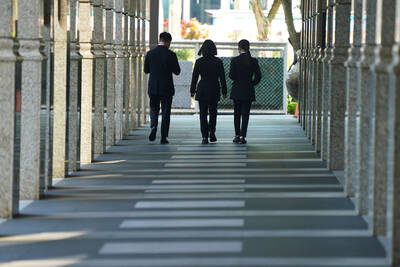Soho opened late last month in the space that formerly housed the swanky Belle Fusion. Whereas Belle used the fifth floor and rooftop space as dining areas, Soho has transformed the space into Urban 9 Bar, a lounge bar that opens at 9pm.
Ceiling-to-floor windows bathe Soho in natural light during the day and lend the place a romantic atmosphere at night. The walls on the first floor, painted granite gray and punctuated by girders and supporting gray brick pillars keep the vibe downtown. The second floor has more of a country feel, with wooden seats at widely spaced tables.
Belle Fusion was known much for its food as its ambience, and the high-end crowd that frequented the space paid a hefty price for their victuals. Soho goes in the opposite direction with a simple menu of salads, soups, burgers, hot dogs, baked rice dishes and Italian pastas — in other words, pub food in a fashionable environment.
This could have ended up a disappointment — especially for those expecting a healthy lunch or dinner. But where Soho is short on menu refinement, the food it offers is solid and the portions appropriate for the price.
I started off with the garden salad (NT$80) and the homemade Mexican white bean stew (NT$80). The salad was an uncreative mix of iceberg lettuce, cucumbers and sprouts. The mound of greenery was sprinkled with raisins and came swimming (some might say drowning) in an Italian dressing. Thankfully, the dressing was a zesty combination of olive oil, balsamic vinegar, spices and chopped onions. Yet a leaf or two of radicchio or even some romaine would have uplifted this unexceptional salad.
The Mexican white bean stew was an improvement on the starter. Actually, it wasn’t so much of a stew as it was a thick soup. The white beans had been blended with onions and squash before being added to the creamy and un-oily broth that contained dried spices. The flavor was light and the white beans lent the soup a subtle and delicious smoky flavor.
The main course mushroom cheeseburger (NT$190) served with potato wedges won’t win any “burger of the year” awards but it was served with a generous selection of veggies.
The food at Soho might not captivate the palate, but the atmosphere — particularly on the second floor — is ideal for whiling away a few hours with friends. The fifth floor and enclosed glass rooftop space are sure to gain accolades from late-night nibblers.

JUNE 30 to JULY 6 After being routed by the Japanese in the bloody battle of Baguashan (八卦山), Hsu Hsiang (徐驤) and a handful of surviving Hakka fighters sped toward Tainan. There, he would meet with Liu Yung-fu (劉永福), leader of the Black Flag Army who had assumed control of the resisting Republic of Formosa after its president and vice-president fled to China. Hsu, who had been fighting non-stop for over two months from Taoyuan to Changhua, was reportedly injured and exhausted. As the story goes, Liu advised that Hsu take shelter in China to recover and regroup, but Hsu steadfastly

Taiwan’s politics is mystifying to many foreign observers. Gosh, that is strange, considering just how logical and straightforward it all is. Let us take a step back and review. Thanks to the Chinese Nationalist Party (KMT) and the Taiwan People’s Party (TPP), starting this year people will once again have Christmas Day off work. In 2002, the Scrooges in the Democratic Progressive Party (DPP) said “bah, humbug” to that. The holiday is not actually Christmas, but rather Constitution Day, celebrating the enactment of the Constitution of the Republic of China (ROC) on December 25, 1947. The DPP and the then pan-blue dominated legislature

Focus Taiwan reported last week that government figures showed unemployment in Taiwan is at historic lows: “The local unemployment rate fell 0.02 percentage points from a month earlier to 3.30 percent in May, the lowest level for the month in 25 years.” Historical lows in joblessness occurred earlier this year as well. The context? Labor shortages. The National Development Council (NDC) expects that Taiwan will be short 400,000 workers by 2030, now just five years away. The depth of the labor crisis is masked by the hundreds of thousands of migrant workers which the economy absolutely depends on, and the

If you’ve lately been feeling that the “Jurassic Park” franchise has jumped an even more ancient creature — the shark — hold off any thoughts of extinction. Judging from the latest entry, there’s still life in this old dino series. Jurassic World Rebirth captures the awe and majesty of the overgrown lizards that’s been lacking for so many of the movies, which became just an endless cat-and-mouse in the dark between scared humans against T-Rexes or raptors. Jurassic World Rebirth lets in the daylight. Credit goes to screenwriter David Koepp, who penned the original Jurassic Park, and director Gareth Edwards, who knows